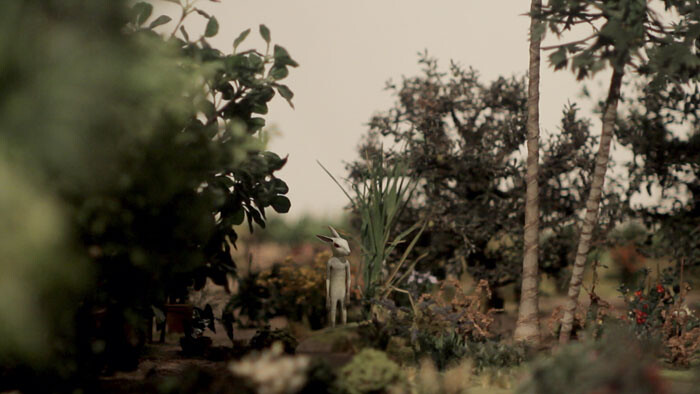The Host and the Cloud, the most recent work of Pierre Huyghe, is an overwhelming mise-en-scène of the contemporary imaginary. The action (of the film) takes place in the former building of the Musée National des Arts et Traditions Populaires. Built by Jean Dubuisson—a disciple of Le Corbusier—and located in the Bois de Boulogne, it was an innovative experiment, conceived to offer a synthetic vision of the traditional French society and constituted as a museum-laboratory, in which conservators and researchers worked close together. Thus, this architectonic monument becomes the set of a vertiginous journey into the heart of pure thought and basic instincts, hosting a series of episodes that took place during three symbolic festivities: Valentine’s day, 1st of May, and Halloween.
The work’s incommunicableness is its strongest feature: it attests that thought is structured around visions and images, which crumble apart when turned into discourse because, on one hand, they do not obey any conventional logic of narrative, and, on the other, they explode simultaneously in so many levels that words automatically submit them to a spatial-temporal hierarchy that corrupts the whole ensemble. Here, the feeling of the critic is similar to that of trying to describe a dream, or even better, a very intense psychedelic experience, such as an acid trip. The only possible way to do so is to continuously jump from one realm to another, trying to ignore any time or sequential logics.
The childhood imaginary is perceivable from the first moment. It’s Halloween Day and a group of people, disguised in costumes, traverse the empty museum idly, sporadically surprised by incarnate clichés of fabulous evil spirits such as the boogeyman or the jack-o’-lantern. If in This is Not a Time for Dreaming (2004) Huyghe used puppets for real people (i.e., Le Corbusier or himself) here he inverted the roles of dummies, who become agents of surprise and fear (as puppet-like actors), dwelling in the space deprived of their faculties of action and being.
And if moments ago these people were under the control of an invisible Other, now that it is Valentine’s Day, they are possessed by inordinate emotions leading them towards an intense moment: the crowd of rigid and inanimate workers turns into a lascivious mass of bodies in a dark basement. The place-keeper of all secrets, all that was once hidden now becomes the catalyst for primitive and animal drives. In the background, the alienating voice of Kate Bush pleas with a hypnotic melody (“Oh let me have it, let me grab your soul away…”) and on a different stage, a man is being condemned to virtual castration by a group of individuals whose faces are covered by luminous, technological device that resembles a book. His crime? Internet rape. Moments after, someone starts narrating the story of Steve Jobs: a perverse amalgam of idealism and reality.
On yet another level, a girl goes through the rituals of psychoanalysis to confess the origin of her traumas, a subtle nod to how psychoanalytic discourses contribute to the forging of our identity. Intimacy, fantasy, subjugation, and power are so deeply intertwined that at a certain point you pass from the voluptuous multitude to the dry and aggressive sensuality of a model that turns the hall of the museum into a catwalk, producing an extremely violent sound every time she steps in with a different costume. We pass from carnal desire to the reification of the body, which symbolically corresponds to the arrival of May Day, which closes the plot with yet another triumphant memorial of shallow festivity emptied of content due to its overuse.
Huyghe never calls The Host and the Cloud a film: it is always referred to as an experience, a real situation, a ritual. In fact, if film is about a darkness in which projected moving images have the power to generate one the strongest displays of fantasy ever known, this is not a film, but the experience of a “meta-film.” Its complexity relies on the fact that it does not simply reflect upon the production of the imaginary (which continues to be one of art’s biggest tasks). Rather, it goes one step further, showing how those elements—films, images, sounds, feelings—that constitute the production of the visions, empathies, and projections give shape to western culture.
To quote a famous sentence by an incurable cinephile and psychoanalyst, Slavoj Žižek, I would dare to say that The Host and the Cloud does not tell us how or what to desire: it shows us how we desire.




